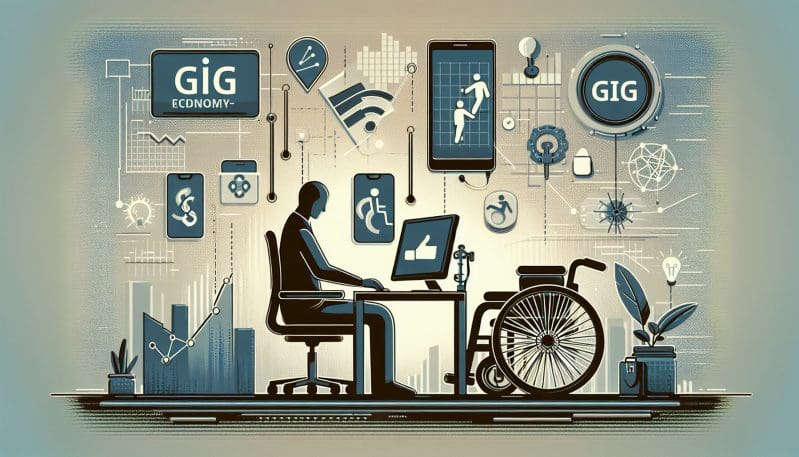The Gig Economy and Disability: Navigating a New Frontier
- Home
- The Gig Economy and Disability: Navigating a New Frontier
- Editors Desk
- January 12, 2024
- 0 Comments
The rise of the gig economy has been nothing short of transformative, redefining the essence of work in the 21st century. This burgeoning sector presents a wealth of opportunities, characterized by flexibility, autonomy, and the promise of self-directed work. Yet, for workers with disabilities, the gig economy is a labyrinth of both potential and peril, a new frontier that beckons exploration and accommodation.
As a steadfast advocate for disability rights, it is crucial to underscore the ambivalence that workers with disabilities may feel towards the gig economy. At its best, the gig economy can offer customizable workloads, allowing for a person-centric approach that tailors job responsibilities to the individual’s abilities and schedule. This level of customization could be a game-changer, especially for those whose disabilities necessitate a non-traditional work environment or flexible hours.
Conversely, the lack of traditional employment protections is a looming specter over the gig economy. Disability or not, gig workers typically operate without the safety nets of healthcare, retirement plans, or even guaranteed minimum wage. This precariousness is magnified for disabled workers, who often face higher medical costs and may require stable income for specialized services or equipment.
The accessibility of gig platforms is another critical concern. Digital interfaces that lack proper accommodation, such as screen reader compatibility or alternative input methods, can exclude a significant portion of the disabled workforce. The on-demand nature of gig work, which heralds speed and efficiency, must not eclipse the paramount need for accessibility.
In light of these challenges, there is an urgent call to action for gig economy companies. Embracing inclusivity not only widens their talent pool but enriches the gig economy with a diversity of perspective and experience that is the hallmark of innovation. Companies can implement disability-friendly policies, invest in accessible technology, and create support systems that cater to disabled workers.
For workers with disabilities, the gig economy can be a platform for empowerment when navigated with savvy and support. Networking with other gig workers, utilizing online resources, and advocating for one’s needs becomes a part of the new gig economy toolkit. Incubators that focus on disabled entrepreneurs and gig workers, mentorship programs, and disability-focused job boards are burgeoning resources that can guide one through this nascent work landscape.
By sharing the stories of disabled gig workers who have carved out their own niche in this economy, we spotlight the boundless potential that lies within the intersection of disability and gig work. These narratives are not just inspirational; they are instructive, providing a blueprint for success that underscores agency, creativity, and resilience.
Ultimately, ‘No Worker Left Behind’ is more than a motto; it is a commitment to inclusive growth and equality. As we traverse the gig economy, we must ensure that this new frontier is navigable for all, erecting signposts of accessibility and inclusion along the pathways of innovation. Our aim is not only to shed light on the complexities of working in an on-demand economy but to forge a path that ensures every worker, regardless of disability, can participate fully and effectively. The gig economy is here to stay, and with the right approaches, it can be a vibrant marketplace of opportunity for everyone.
At No Worker Left Behind, we stand at the forefront of this exploration, committed to dismantling barriers and building bridges. Join us as we delve into the nuances of the gig economy and disability, advocating for a future where the gig economy is synonymous with opportunity, inclusivity, and the full expression of every individual’s talents and aspirations.
Choose Layout
Main Color Scheme
- RTL Version
- LTR Version

